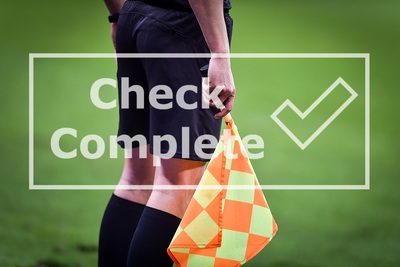 Another weekend of football, another round of VAR controversy.
Another weekend of football, another round of VAR controversy.
Most fans of the beautiful game have now come to terms with the fact that the video refereeing system cannot solve all of football’s ills – when it comes to adjudging whether a tackle is actually a foul, or whether a foul/physical contact is a red card offence, we are still in the land of subjectivism on the part of human beings.
But one area in which VAR should, in theory, be bullet-proof is in black-and-white decisions; things like offside, where a player is simply onside or not. No opinion required.
Of course, that is true until the humans in charge of VAR make a colossal balls-up of using the technology – as was the case in Liverpool’s 1-2 defeat to Tottenham in September.
The Reds’ Luis Diaz was adjudged to be offside when breaking through the Spurs defence, so his goal was ruled out. No problem: let’s go to VAR to see what they’ve seen.
But those in the know have reported that the VAR officials, while correctly determining that Diaz was in fact onside, relayed the wrong message to the on-field referee – therefore, the intervention wasn’t communicated properly and so the goal could not stand.
Understandably, Liverpool were furious and threatened to ‘escalate’ their complaints – but can the result of a football game be overturned or changed due to a VAR mess-up?
So What Actually Happened in the Tottenham v Liverpool Game?
Diaz was judged to be in an offside position during the build-up to his disallowed goal by the on-field officials.
It was the wrong call, but given how fast the typical Premier League game is – and the tight margins that these offside decisions are defined by – it was wholly forgivable. Ultimately, VAR is in place to prevent these ‘injustices’ from happening.
According to those in the know, the officials in the VAR booth correctly carried out their job – drawing on the lines which confirmed that Diaz was in fact played onside by Tottenham defender Cristian Romero.
But it’s thought that the duo, Darren England and Dan Cook, had – through a ‘lapse in concentration’ according to PGMOL – were of the belief that the on-field officials had given the goal, and so they didn’t communicate that an intervention was required; hence the ‘check complete’ message was relayed and the ‘goal’ was not reinstated.
PGMOL issued a grovelling apology, decrying the ‘significant human error’, and dropped England and Cook from taking charge of the Nottingham Forest vs Brentford game the following day.
Unsurprisingly, Liverpool boss Jurgen Klopp was apoplectic after the game – a human being failing to press the right button has cost his side at least a point, and later it emerged that the Reds planned to ‘escalate’ their complaint.
“It is clear that the rules of the game were not applied correctly, which undermined sporting integrity,” the club said in a statement.
“It is therefore unsatisfactory that sufficient time was not given to allow the correct decision to be made and that there was no subsequent intervention.”
So why didn’t the VAR officials admit their mistake immediately after the incident and intervene accordingly? And what escalation powers do Liverpool have at their disposal?
Falling on Deaf Ears

As is the case in these scenarios, the Premier League, FIFA, UEFA and all of the other governing bodies in football fall back on the rules and guidelines of the International Football Association Board (IFAB), who ultimately hold all the cards when it comes to rulings of the beautiful game.
And in their very specifically worded rulebook, they leave just enough grey area to suggest that Liverpool could have a case in their ‘escalation’ – presumably they believe that the game against Tottenham should be replayed.
According to IFAB, there was nothing that referee Simon Hopper could have done on the day to rectify his colleagues’ mistake.
“If play has stopped and been restarted, the referee may not undertake a ‘review’ except for a case of mistaken identity or for a potential sending-off offence relating to violent conduct, spitting, biting or extremely offensive, insulting and/or abusive action(s),” read the IFAB rules.
In this case, Hooper received the information that the VAR officials had dropped a clanger too late – the game had already progressed to the point that he had no recourse that would allow him to ‘reinstate’ the goal.
As for Liverpool’s next steps, judge for yourself whether they have a chance of redemption:
“In principle, a match is not invalidated because of malfunction(s) of the VAR technology or for wrong decision(s) involving the VAR (as the VAR is a match official).”
But those words ‘in principle’ offer just enough wriggle room for Liverpool to make a forceful case that the game should be replayed – in principle, they’d be right given that the VAR officials got things so badly wrong.